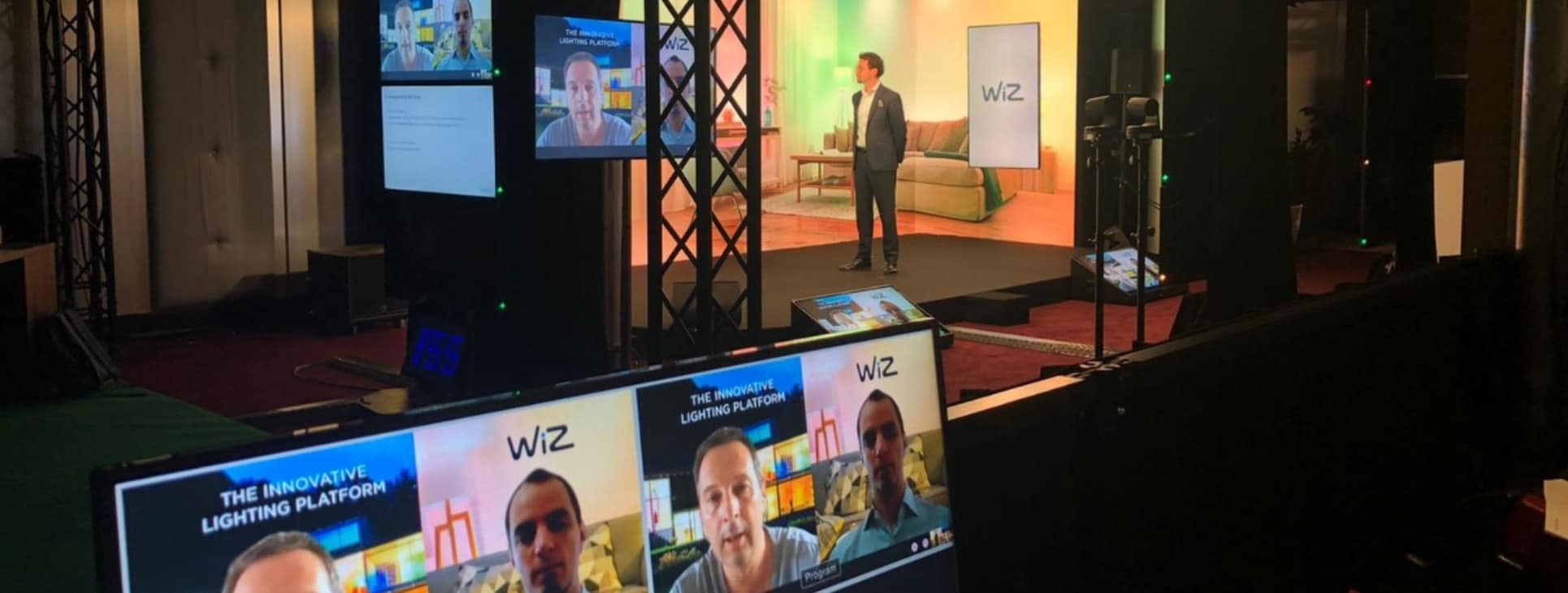Hybrid events: the new business events!

Hybrid events: the new business events!
You probably didn't miss the fact that the B2B- and B2C event industry has been turned upside down since the start of 2020. Suddenly, marketers, event planners, and project managers had to switch from big sales events in exhibition halls to webinars and video congresses on digital platforms. And surprisingly, the results between these two completely different worlds turned out to be just as good! In some cases, online events have a few advantages, for example: reaching a larger audience at a lower cost.
Online events have earned their place in the world of event organization. And as we slowly return to a society where events can take place physically again, the following question arises:
What will business events look like from now on?
Our answer to this question: hybrid events!
What is a hybrid event?
Don't let the futuristic term scare you: a hybrid event is simply a combination of an offline- and online event. Just as a hybrid car has two engines, a hybrid event has both a face-to-face aspect with visitors on location and an online aspect where visitors can participate and interact digitally.
The advantages:
- Flexibility: your audience can choose whether they want to physically be at the location of the event or log in online. Visitors who only want to join one part of your event can participate at a time of their choosing.
- Maximum impact: if a visitor is attending your event live on location, this person has scheduled free time for this. This type of visitor is the most involved with your brand or (product)launch. And thanks to the hybrid form of your event, you really connect and build relationships with your audience.
- Increased reach: the online aspect is ideal for visitors who are unable to travel to the location of your event.
- Sustainability: Less traveling visitors = less C02 emissions
- Data-collection: more possibilities to collect specific data.
- Meets the new expectations of your visitors: in the past year, not only organizers, but also visitors have gotten used to online events. It may be that part of your target audience prefers online, with a hybrid event you can meet both demands.
Are you convinced of the benefits of hybrid events, and do you want to start organizing? Read our top tips.
Organizing a hybrid event: tips & tricks
In the past year we have been fully engaged in organizing and supporting online and hybrid events for clients such as Spar, DSM, ICOM, FBK Games, University of Twente and Erasmus University.
Learn from our experiences and use the following tips for your next event:
To be able to determine which form of events suits you best, it is essential to have well-thought-out goals: do you want to inform, inspire or convert your audience? Your activities must mutch these objectives as closely as possible, you can determine the form of your event if you have clear goals.
Don't be mistaken: you cannot organize a hybrid event on your own. Because of the combination of two worlds you are adding a completely new dimension compared to an event that solely takes place either digitally or physically. When organizing a hybrid event you are working cross-channel to provide the best customer experience for two different types of participants. This is not only a substantive challenge but also a physical and technical challenge. And this is the exact reason why it's so important to work with a team of experts, not only in preparation for the event but also on the day the event takes place.
TRIMM has a specialised team for online and hybrid events
A good digital event platform is scalable, accessible 24/7 on every device, and ensures that your event can be organized quickly and efficiently. This is even more important in the case of a hybrid event because both offline- and online experiences have to match each other seamlessly. This is why it's important to pay close attention to the choice of an event platform. Ideally, you can use the platform for a longer time.
Lots of online events can be well combined with an offline element. For example: consider a live panel discussion between guests who are physically present at the event, to which your visitors can ask questions via a (live)chat. Or a poll where both offline and online visitors can vote on relevant issues.
A lot is going on during a hybrid event, and this is why it's important to think carefully about how you are going to organize your time in advance. Don't forget to communicate your planning with everyone involved beforehand: this way they can give feedback on time, and maybe they will make some suggestions about things you didn't even consider yet. Extra tip: do a dry run (a rehearsal) of the event beforehand. This makes sure you are optimally prepared.
One of the biggest advantages of online- and hybrid events is the possibility to collect specific data. Make sure you have a plan ready on how to use this data before the event takes place. For example: analyze on-page and video metrics to learn how to improve for future events. Set up a lead nurturing strategy to convert (part of) your audience.
Need help on how to use collected data? Our digital Marketeers are happy to help!
We expect that hybrid events will form a regular part of every B2B/B2C marketing strategy in the future. If you don't have a lot of experience in organizing these types of events, it is a good idea to start small. For example: consider organizing a webinar with one or a few interactive elements. You will see that it's worth the effort! From large and multi-day conferences to webinars, hybrid events can form success for any business!